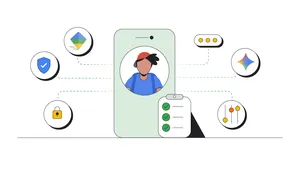How this Kenyan startup is using AI to help MSMEs grow

Micro, small, and medium enterprises (MSMEs) are the backbone of economies, making up around 90% of all businesses globally. In Africa, they're vital for fueling local economies and supporting millions of livelihoods. Yet, many of these businesses, especially in Kenya, struggle to harness the power of AI tools — often due to unreliable internet access and low-power devices.
For Mutembei Kariuki, co-founder and CEO of Fastagger, this challenge was a call to action. Along with co-founders Jude Mwenda and Stephanie Njerenga, he set out to empower business owners by building an infrastructure that enables AI and machine learning models to run directly on basic devices.
Instead of relying on constant connectivity, the Fastagger team designed AI tools that work seamlessly on low-end smartphones—even without an internet connection.
In 2023, Fastagger joined the Google for Startups Accelerator: AI First program, which presented an opportunity to refine their AI infrastructure and scale the business.
Mutembei shared how they are democratizing AI and supporting MSMEs by creating solutions that work on the devices these businesses already own.
The demand for AI solutions helped us reach MSMEs
As co-founders, we're fortunate to have studied and worked with various companies globally," Mutembei explains. "This gave us a strong foundation in computer science, machine learning, and AI as we entered the startup scene."
Fastagger launched in 2019, but raising capital was initially tough. "Many believed there was no AI talent in Africa," he recalls. However, a major turning point came during the COVID-19 pandemic in 2020 when they began building ML and AI models for data labeling projects in South Korea and the US.
Around the same time, they partnered with the Kenya Private Sector Alliance (KEPSA). This collaboration opened doors for them to present their solution in webinars attended by hundreds of MSMEs. "Many business owners approached us," Mutembei says, "because they were losing customers and lacked structured data to track sales and customer engagement."
To help, Fastagger received transaction statements via WhatsApp, analyzed them with their AI systems, and sent back reports detailing top customers. "For instance, one barbershop discovered they had about 180 loyal customers every month—a number they hadn't tracked before, which then helped them expand," Mutembei shared.
"Once we saw the impact these insights had, we realized we could do so much more.”

Mobile money was the entry point for our AI solution
"Our main goal is to make AI work for the continent," Mutembei states. "Mobile money is a unique aspect of our markets, and it gave us a clear entry point." So, they developed a more secure platform that business owners could download from the Google Play Store.
This is how Auni was born. This business intelligence assistant integrates with the popular mobile money platform, M-PESA, converting financial statements into actionable insights. Auni helps business owners understand customer trends and develop strategies to boost sales and revenue.
After nearly two years of building and testing, Fastagger partnered with Kenya’s telco giant, Safaricom, to officially launch Auni on the M-PESA Business app in March 2024. "Within the first month, over 600 MSMEs adopted the solution," Mutembei proudly notes. "While this is our first proof point of what's possible with the devices we have in Africa, starting with mobile money, our vision is for it to also work offline as we scale."
Our mission is to democratize AI for everyone
"Joining the Google for Startups Accelerator: AI First program allowed us to significantly scale our solutions," Mutembei explains. "For starters, we used the cloud credits to build the infrastructure that we’re now using to bridge the AI divide—including our own foundation document model tailored for African financial documents. We realized that existing models couldn’t accurately support the needs of MSMEs in our market."
Today, Fastagger’s software stack infrastructure is designed to reduce AI's carbon footprint by doing most of the work offline—especially for those using affordable smartphones.
"If our models can work offline on low-end smartphones," Mutembei emphasizes, "it means a healthcare worker in a rural clinic can use AI to triage patients without needing data bundles, a teacher can prepare lessons in a classroom with no Wi-Fi, and a small business can access insights without incurring expensive cloud costs."
And Fastagger isn't stopping in Kenya. They aim to expand into other M-PESA markets like Tanzania, Ethiopia, DRC, and Egypt, while also exploring partnership opportunities with telcos across Southeast Asia, Latin America, and beyond.
You can find out more about Fastagger here.






